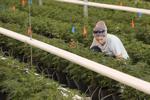Kerry Trammel and Michael Yager are excited to be at the forefront of New York’s recreational cannabis industry.
But they’re also nervous, since the market hasn’t been established yet and they’re not sure exactly what to expect.
Trammel, owner of The Releaf Market in Jamestown, and Yager, one of the owners of Yager Farms in Eden, are among the 52 growers granted the first licenses to cultivate adult-use recreational marijuana in the state.
Considered sovereign tribal land in the eyes of the government, Native Americans from the Seneca Nation of Indians and Tonawanda Seneca Nation have set up shop on reservations in Cattaraugus, Allegany and Genesee counties.
Wheatfield Gardens in Wheatfield is the other local business that was awarded a license from the state Office of Cannabis Management.
Trammel and Yager’s licenses allow them to cultivate marijuana and sell it to processors or dispensaries that will then sell to the public for recreational use. The state still has not granted licenses for retailers, but plans to give those first retail licenses to people affected by marijuana-related criminal convictions.
People are also reading…
“Being the first in the state to be able to operate is an exciting time,” Trammel said. “We’ve got a learning curve here to learn the rules and regulations.”
Trammel and Yager both expect to begin planting marijuana around the beginning of June and harvest the crop in September and October.
But before then, there’s still much to be done as they navigate this new industry.

A worker inspects marijuana plants at Tweed Farms in Niagara-on-the-Lake, Ont.
Yager is researching which strains of cannabis will grow best in Western New York’s climate, and Trammel has been speaking with potential local dispensaries to establish business relationships.
“There’s probably going to be some strains that just aren’t conducive to our weather,” Yager said. “We’re going to choose poorly on a couple and we’ll lose some, but it’s a learning curve. We won’t use that next year and we’ll go forward.”
Licensees can grow marijuana outdoors or in a greenhouse. Yager plans to grow outdoors this season, while Trammel is going to do both outdoor and indoor farming.
In addition to helping to run his family’s longtime farm, Yager works as an engineer for the federal government. However, he soon will have to leave his job once he starts growing marijuana because it’s still federally illegal.
But Yager doesn’t want to see the federal government legalize marijuana because that would mean it could be sold across state lines, leading to more competition for growers in New York.
Yager Farms is a small family farm. They chose to grow marijuana to try to maximize their revenue, Yager said.

The town’s zoning code prohibits adult uses from within 1,500 feet of one another, or 1,500 feet from residential zones or existing schools or places of worship.
“It’s simply a numbers game,” he said. “If I can take an acre of peppers or an acre of recreational cannabis and make more raising the recreational cannabis versus peppers, to me as a business person, as a numbers person, it just makes sense.”
Trammel also believes growing recreational marijuana will benefit her business.
“The hemp farmers have struggled for several years and I think this is going to be a way that we can grow forward,” she said.
It’s been a little over a year since former Gov. Andrew Cuomo signed the state’s adult-use cannabis legalization bill into law. Regulators have spent months preparing for implementation, and Gov. Kathy Hochul in February signed legislation to grant the conditional licenses in an effort to fast track the opening of the state’s adult-use cannabis market.
More than 150 applications for conditional licenses were submitted to the state and those applications are being reviewed for approval on a rolling basis, according to the governor’s office. The licenses are temporary and expire at the end of June 2024.


Be the first to comment